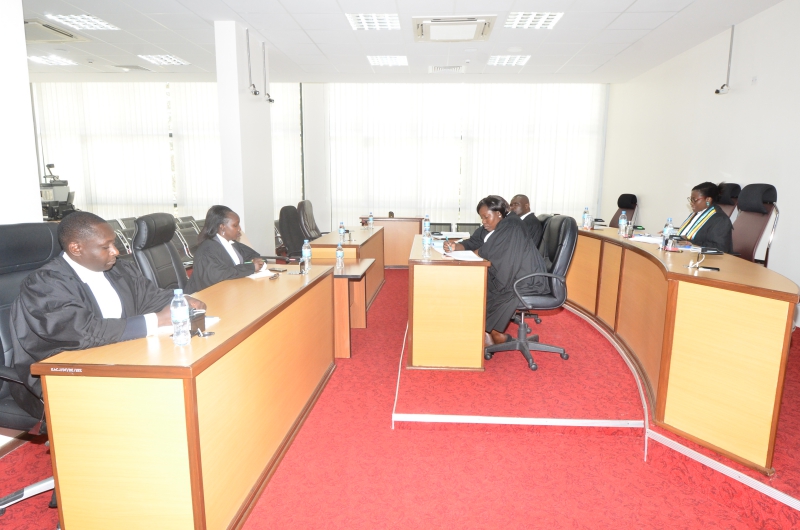
Regional Court dismisses Application by NGOs in Burundi seeking leave to Appear as Friends of the Court
East African Court of Justice Arusha, 27th September, 2018: The First Instance Division declined to grant the Applicants the leave sought to appear as amicu curiae (friends of the Court) in a matter that challenges the government’s order (a Ministerial Ordinance No. 530/1922) dated 19th October 2016, that banned activities and programs of five Burundian non-governmental organizations and froze their accounts and assets.
The Court in its Ruling said that the Application falls short on proof of the Applicants’ expertise, neutrality or fidelity to the law and would therefore not succeed had it considered its merits. Further Court said that the benefits of the concept of amicus curiae hinge significantly on the neutrality, impartiality and independence of prospective amicus curiae, as well as the expertise it avails to a court underscored by its provable fidelity to the law.
That If sufficiently established by an applicant, these parameters would significantly hinder or mitigate the incidence of subjectivity or mal-advice in a successful applicant’s amicus brief. They would be, to that extent, fundamental determining factors in an application for leave to appear as amicus curiae. Consequently, an application that does not reasonably demonstrate proof of the foregoing factors would not justify an applicant’s admission as amicus curiae.
In addition Court said that it found no justification to satisfy the Court that the Application is justified as required under Rule 36(4) of the Court’s Rules to grant the Applicants leave to join matter Reference No. 12 of 2016 as amicus curiae.
Court also said that no reference whatsoever was made to or proof furnished of the Applicants’ neutrality. Most certainly, the Applicants’ expertise (had it been proven) would not in itself have amounted to sufficient proof of neutrality by the Applicants.
Further the Court said that, it reasons from the foregoing Rule a mandatory requirement for all formal applications filed in this Court to be supported by affidavits. Thus, in the absence of the sole Affidavit in support thereof, it follows that the Application before us remains unsupported by any affidavit and, to that extent, contravenes the mandatory provisions of Rule 21(5).
The Court hence dismissed the Application with no orders to costs. The Ruling was delivered by Honorouble Lady Justice Monica Mugenyi, (Principal Judge), Justice Dr Faustin Ntezilyayo (Deputy Principal Judge), and Justice Fakihi A. Jundu.
Parties present in Court to receive the Ruling were Dr Anthony Kafumbe representing the Secretary General of EAC and Wanjiru Mnaro holding brief for Catherine Anite representing the Applicants.
The Applicants (3 NGOs) are: KENYA HUMAN RIGHTS COMMISSION (KHRC); FOUNDATION FOR HUMAN RIGHTS INITIATIVE (FHRI) & INTERNATIONAL FEDERATION FOR HUMAN RIGHTS (FIDH)
Notes For Editors:
Applications for leave to appear as amicus curiae in this Court are governed by Rule 36 of the Court’s Rules of Procedure. It reads:
- An application for leave to intervene under Article 40 of the Treaty and an application for leave to appear as amicus curiae shall be by notice of motion.
- An application under sub-rule (1) shall contain –
- A description of the parties;
- The name and address of the intervener;
- A description of the claim or reference;
- The order in respect of which the intervener or amicus curiae is applying for leave to intervene;
- A statement of the intervener’s or amicus curiae’s interest in the result of the case.
- The applicant shall serve on each party who shall, within thirty (30) days, file and serve a response.
- If the Court is satisfied that the application is justified, it shall allow the intervention and fix a time within which the intervener or amicus curiae may submit a statement of intervention and the Registrar shall supply to the intervener or amicus curiae copies of the pleadings.
Rule 21 (5) provides that: Every formal application to the First Instance Division shall be supported by one or more affidavits of the applicant or of some other person or persons having knowledge of the facts…
ENDS
For more information, please contact:
Yufnalis Okubo
Registrar
East African Court of Justice
Arusha, Tanzania
Tel: +255 27 2162149
mail: Okubo [at] eachq.org
www.eacj.org
About the East African Court of Justice:
The East African Court of Justice (EACJ or ‘the Court’), is one of the organs of the East African Community established under Article 9 of the Treaty for the Establishment of the East African Community. Established in November 2001, the Court’s major responsibility is to ensure the adherence to law in the interpretation and application of and compliance with the EAC Treaty.
Arusha is the temporary seat of the Court until the Summit determines its permanent seat. The Court’s sub-registries are located in the respective National Courts in the Partner States.
Tags: EACJ
